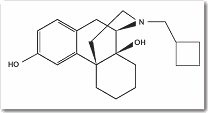Butorphanol
Butorphanol is a narcotic analgesic or a narcotic pain killer. In its tartrate form is a white, crystalline substance.
Dolorex, the new Merck Animal Health analgesia, is based on the active butorphanol.
In humans, butorphanol is most commonly administered for pain relief to people who have undergone surgery or to those who may have serious injuries and require pain management intervention.
The drug has gained wide acceptance, generating over $140 million in annual sales for Bristol Myers Squibb through brand names such as “Stadol NS”. It is usually delivered by injection. For the estimated 23 million migraine headache sufferers in America, butorphanol is administered as a nasal spray.
Butorphanol can either be prepared synthetically or from thebaine (chemical formula C19H21NO3), an alkaloid which occurs in opium (Papaver somniferum) and in certain of its preparations. It is indirectly related to morphine, but has very similar effects (agonist) and can be addictive. Butorphanol also has antagonist effects, meaning that it can the reverse the effects of some other opioid agonists.
With a pharmacological and therapeutic profile that has been well established since its launch as a parenteral formulation in 1978, butorphanol is a synthetic opioid agonist-antagonist analgesic.
| Feature | Benefit |
|---|---|
| Potent molecule | Effective in moderate to severe pain |
| Few morphine-like side effects | Less behavioral changes and other morphine related side effects |
| Registered for use in combination with alpha 2-agonist | Lowers the dose, fewer side effects |
| Can be used intramuscularly as well as intravenously | Provides a choice |
| Two presentations | Provides a choice |
| Registered for use in dogs and horses | Provides a choice |
| Butorphanol is a well-known molecule | Molecule has proven itself |
| IV possible + characteristics molecule | Rapid result |
| Short acting | Repeat use possible |
| Characteristics molecule | Less sedative effect than other opioids |


